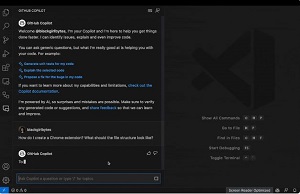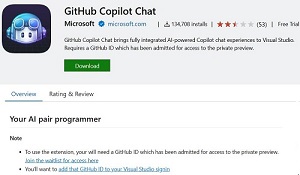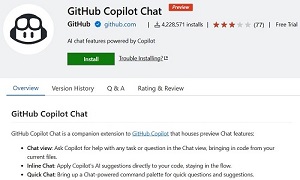News
GitHub Copilot Chat Nears GA: 'Today We Are Re-Founded on Copilot'
GitHub announced its "Copilot Chat" offering will reach general availability next month as the company goes all in on AI.
"Just as GitHub was founded on Git, today we are re-founded on Copilot," the company said yesterday (Nov. 8) during its GitHub Universe event.
The Microsoft-owned company famous for its open source-centric code hosting platform likened the current AI-driven coding revolution to the 2005 debut of Git as fundamentally transforming the software development space.
"We are certain this foundational transformation of the GitHub platform, and categorically new way of software development, is necessary in a world dependent on software," said CEO Thomas Dohmke. "Every day, the world's developers balance an unsustainable demand to both modernize the legacy code of yesterday and build our digital tomorrow. It is our guiding conviction to make it easier for developers to do it all, from the creative spark to the commit, pull request, code review, and deploy -- and to do it all with GitHub Copilot deeply integrated into the developer experience."
 [Click on image for larger, animated GIF view.] GitHub Copilot Chat in Animated Action (source: GitHub).
[Click on image for larger, animated GIF view.] GitHub Copilot Chat in Animated Action (source: GitHub).
It will become even more deeply integrated next month with the GA debut of GitHub Copilot Chat, which adds interactive generative AI functionality to the original "AI pair programmer" tool that spawned the "Copilot" moniker now being used throughout the industry to describe AI-powered assistants of all kinds, especially at Microsoft. Redmond, thanks to owning GitHub and being the major investment partner of OpenAI which created Copilot's AI tech, has infused "Copilots" into a wide swathe of products and services.
Whereas the original tool was primarily designed for code generation directly in a code editor -- suggesting whole lines or blocks of code as a developer types -- the Chat interface lets devs interact with GitHub Copilot to ask coding-related questions and get typed answers directly within a supported IDE like Visual Studio or the Visual Studio Code editor. Capabilities include natural language descriptions of a code chunk's functionality and purpose, generating unit tests and proposing bug fixes.
 [Click on image for larger view.] Visual Studio Tool (source: Visual Studio Marketplace).
[Click on image for larger view.] Visual Studio Tool (source: Visual Studio Marketplace).
 [Click on image for larger view.] Visual Studio Code Tool (source: Visual Studio Code Marketplace).
[Click on image for larger view.] Visual Studio Code Tool (source: Visual Studio Code Marketplace).
GitHub Copilot Chat actually comes in two separate extensions for Visual Studio and VS Code. As can be seen above in the respective marketplace entries for the Visual Studio and VS Code tools, the latter offering is way more popular, boasting more than 4.2 million installs as compared to 134,708 installs at the time of this writing for the Visual Studio IDE extension. Also note that the IDE extension comes from Microsoft, while the VS Code extension (in preview for now) comes from GitHub.
GitHub Copilot Chat will be generally available in December as part of existing GitHub Copilot subscriptions for organizations and individuals, while it can be used at no cost by verified teachers, students and maintainers of popular open source projects.
"Coding is the centerpiece of the software development lifecycle," Dohmke said. "With GitHub Copilot Chat we're enabling the rise of natural language as the new universal programming language for every developer on the planet. Whether it's finding an error, writing unit tests, or helping debug code, Copilot Chat is your AI companion through it all, allowing you to write and understand code using whatever language you speak."
The post announced the following:
- GPT-4 powers Copilot Chat: GitHub upgraded the Copilot Chat experience, bringing more accurate code suggestions and explanations with OpenAI's GPT-4 model.
- Code-aware guidance and code generation: Copilot Chat uses a developer's code as context, and is able to explain complex concepts, suggest code based on open files and windows, help detect security vulnerabilities, and help with finding and fixing errors in code, terminal and debugger.
- Iterate on code with AI-powered inline Copilot Chat: With the new inline Copilot Chat, developers can chat about specific lines of code, directly within the flow of their code and editor.
- Slash commands to shortcut big tasks: GitHub is introducing slash (
/dothis) commands and context variables to GitHub Copilot so fixing or improving code is as simple as entering /fix and generating tests now starts with /tests.
- Apply the power of AI with a click: Smart actions offer powerful shortcuts for workflows with just a click, whether a dev needs to fix suggestions, pull request review content or speed up commits and pull requests with a generated response.
- Bringing Copilot Chat to JetBrains: Copilot Chat will come to the JetBrains suite of IDEs, available in preview now.
GitHub also made many other announcements during GitHub Universe, which concludes today, including the following (linked for more information):
The latter is a new feature that uses AI to automatically generate a plan and code for implementing a change based on a GitHub issue, while allowing developers to edit, test and debug the code before creating a pull request.
Dohmke said GitHub Copilot Chat and associated tooling are part of the company's vision of a new future of software development where AI infuses every step of the developer lifecycle, which is exemplified in the company's "Copilot X" initiative, which states: "GitHub Copilot is evolving to bring chat and voice interfaces, support pull requests, answer questions on docs, and adopt OpenAI's GPT-4 for a more personalized developer experience."
About the Author
David Ramel is an editor and writer at Converge 360.